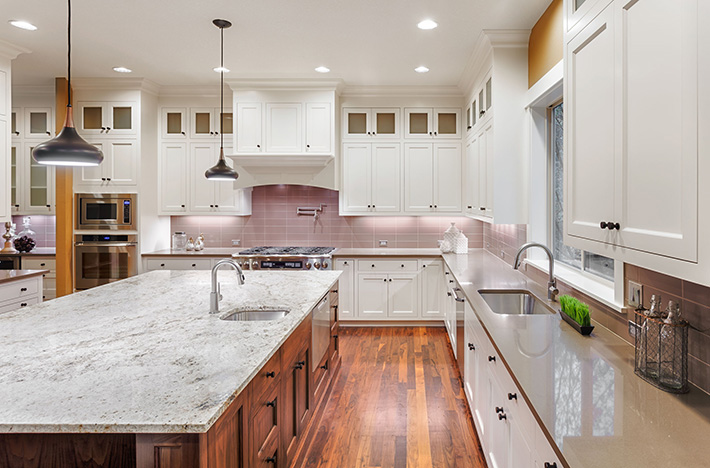Granite countertops are so common that you can expect at least one of your neighbours or friends to have the same countertop design as you have. Every homeowner wants their house to be beautiful yet unique, even when it comes to their kitchen surfaces, or especially then! If you’re looking for new options to bid farewell to old granite countertops, you are at the right place.
Speaking of recent trends, soapstones are making heads turn these days. If you want to find out the suitability of soapstones for your kitchen, make sure you check out a reputable brand such as Caesarstone’s take on it.
Here are the top six alternatives to the usual granite countertops to beautify your kitchen and separate it from your peers.
6 Best Alternative To Granite Countertops
Granite is not the only option when it comes to choosing high-quality kitchen surfaces. There are a plethora of other materials that are equally durable and git for rough kitchen use. Read along to know the top 6 best kitchen surface materials you can use instead of granite.
1. Quartz Countertops
One of the biggest reasons for quartz‘s popularity these days among homeowners is the majestic beauty that it adds to a kitchen. Granite is sought-after for its unique designs and prints, but quartz offers an equally beautiful crystal-like look to your countertops.
In addition to this, quartz is strong enough to bear extreme pressure. Moreover, it is also resistant to moisture and heat. Also, it is not porous, unlike granite. Hence, even if you accidentally spill something on quartz countertops, there are significantly fewer chances that the surface will absorb the stain.

2. Marble Countertops
While quartz is famous for its beauty and durability, marble usually wins hearts for its evergreen elegance. Also, marble is hard and does not crack easily. So, you can be assured that minor kitchen accidents will not leave a dent in your smooth marble countertops.
Marbles also offer decent resistance to heat. However, there are a few downsides to using marble. They are very porous–whether it’s an accidental spill or a burn mark, they absorb and retain all the unwanted stains very easily.
3. Slate Countertops
You should definitely consider slate countertops if the visual appearance of your countertops is not the first on your priority list. The most significant benefit that tags along with slate is that they can withstand extreme pressure without birthing a dent or crack. It also has low porosity levels, which makes it impeccably resistant to stains and spills.
The only disadvantage to using slate is its high cost. Another feature of slate that might act as a drawback for some people is its limited colour options–it is only available in dark grey shades. However, the limitation in terms of colour is also an advantage in a way. The chances of a stain being visible on a dark surface are much lower than when you spill the same thing on a light-coloured surface.
4. Soapstone Countertops
Another material that deserves your attention when you shop around for the perfect countertop for your kitchen is soapstone. The USP of soapstone is its high resistance to heat. Did you know that the material is also popularly used to manufacture cookware? This is proof enough of its toleration towards heat! It is also non-porous, ensuring that it will not absorb stains and dirt quickly. This is a massive benefit for people who do not have enough time to clean the counter every alternate day.
The only downside to using soapstone is that it’s not as hard as granite–it’s a little pliable. However, it does not entirely have to be a drawback. This is because by applying extreme force, brittle materials tend to crack. On the flip side, pliable materials can withstand considerable force. Although soapstone is available in only dark shades, it has a smooth and glossy texture, making it perfect for kitchen use.
5. Sintered Stone

Most elements in their natural state are not suitable to be used as kitchen countertop materials. That’s why more and more people today are shifting towards engineered stones. One such popular engineered material for kitchen countertops is sintered stone. It is artificially created from minerals, clay, and silica.
Since sintered stone is prepared in the laboratory, it is tough, durable, and resistant to heat, making it perfect for kitchen use. It also ranks low on porosity, making it low maintenance and easier to clean. Another advantage of using sintered stone is its waterproof nature.
Hence, if you’re looking for engineered materials for your kitchen surface, you should absolutely lock your eyes on sintered stone. Moreover, they are pretty affordable and come at a rate of $30 to $50, depending upon the brand.
6. Concrete
Concrete is a blessing for those homeowners who want to customize their kitchen countertops. You can add all the shapes and designs you want to a concrete countertop. However, it is relatively costly and can cost anywhere around $50 to $100, depending on the brand. Moreover, the add-ons, too, come at an additional cost.
However, barring the cost, concrete countertops bring with them an array of benefits. Since most concrete countertops are made of glass fibres, they are unaffected by heat and pressure. They are also immune to scratches, so you don’t even have to use the cutting board when cooking your favourite dish on these countertops. However, keep in mind that concrete does retain stains pretty easily. So, you need to get it sealed at least once a year to maintain its sanctity.
Endnote
Building a house is a lifelong dream for most people. Hence, it’s natural that you’d want every corner of your house to be perfect and in line with your preferences. Do not settle for anything less than what you want when it comes to your kitchen countertops. Make sure you pick the best option within your pre-decided budget. Also, it’d be wise to consult professionals before you take on this uphill task.




